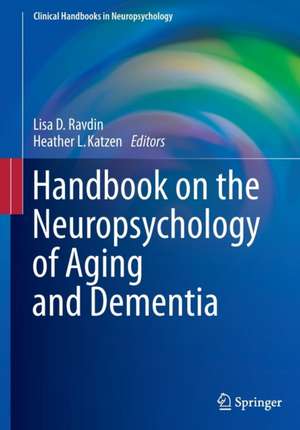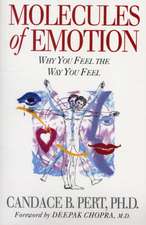Handbook on the Neuropsychology of Aging and Dementia: Clinical Handbooks in Neuropsychology
Editat de Lisa D. Ravdin, Heather L. Katzenen Limba Engleză Paperback – 17 ian 2014
| Toate formatele și edițiile | Preț | Express |
|---|---|---|
| Paperback (1) | 1942.55 lei 43-57 zile | |
| Springer – 17 ian 2014 | 1942.55 lei 43-57 zile | |
| Hardback (2) | 1147.50 lei 43-57 zile | |
| Springer International Publishing – 25 feb 2019 | 1147.50 lei 43-57 zile | |
| Springer – 14 sep 2012 | 2767.11 lei 43-57 zile |
Preț: 1942.55 lei
Preț vechi: 2368.97 lei
-18% Nou
Puncte Express: 2914
Preț estimativ în valută:
371.71€ • 389.07$ • 309.38£
371.71€ • 389.07$ • 309.38£
Carte tipărită la comandă
Livrare economică 31 martie-14 aprilie
Preluare comenzi: 021 569.72.76
Specificații
ISBN-13: 9781461491408
ISBN-10: 1461491401
Pagini: 544
Ilustrații: XV, 527 p. 26 illus.
Dimensiuni: 178 x 254 x 29 mm
Greutate: 0.93 kg
Ediția:2013
Editura: Springer
Colecția Springer
Seria Clinical Handbooks in Neuropsychology
Locul publicării:New York, NY, United States
ISBN-10: 1461491401
Pagini: 544
Ilustrații: XV, 527 p. 26 illus.
Dimensiuni: 178 x 254 x 29 mm
Greutate: 0.93 kg
Ediția:2013
Editura: Springer
Colecția Springer
Seria Clinical Handbooks in Neuropsychology
Locul publicării:New York, NY, United States
Public țintă
Professional/practitionerCuprins
1. Special Considerations for the Neuropsychological Interview of Older Adults.- 2. Consideration of Cognitive Reserve.- 3. Considerations for the Neuropsychological Evaluation of Older Ethnic Minority Populations.- 4. The Assessment of Change: Serial Assessments in Dementia Evaluations.- 5. After the Diagnosis of Dementia: Considerations in Disease Management.- 6. Sleep and Aging.- 7. Medications and Cognition in Older Adults.- 8. Assessment of Depression and Anxiety in Older Adults.- 9. Neuropsychological Assessment and Management of Older Adults with Multiple Somatic Symptoms.- 10. Driving Evaluation in Older Adults.- 11. Environmental Design for Cognitive Decline.- 12. Prevention of Cognitive Decline.- 13. Clinical Neuropsychology Practice and the Medicare Patient.- 14. Professional Competence as the Foundation for Ethical Neuropsychological Practice with Older Adults.- 15. Ethical Considerations in the Neuropsychological Assessment of Older Adults.- Part II: Late Life Cognitive Disorders.- 16. Mild Cognitive Impairment and Normal Aging.- 17. Differential Diagnosis of Depression and Dementia.- 18. Assessment of Alzheimer’s disease.- 19. Vascular Cognitive Impairment.- 20. Assessment in Acute Stroke Rehabilitation.- 21. Accurate Assessment of Behavioral Variant Frontotemporal Dementia.- 22. Movement Disorders with Dementia in Older Adults.- 23. Neuropsychological Considerations for Parkinson's Disease Patients Being Considered for Surgical Intervention with Deep Brain Stimulation.- 24. Idiopathic Normal Pressure Hydrocephalus.- 25. Episodic and Semantic Memory Disorders.- 26. Epilepsy and Aging.- 27. Neuropsychological Assessment of Older Adults with a History of Cancer.- 28. Evaluating Cognition in Patients with COPD/emphysema.- 29. Hepatic Encephalopathy.- 30. Late-Onset Schizophrenia.- 31. Capacity Evaluations in Older Adults: Neuropsychological Perspectives.
Recenzii
From the reviews:
“This is a practical guide to assessment, recommendations, and prevention of cognitive decline and dementia. … The chapters are organized fairly uniformly … . The book includes helpful tables and figures as well as some clinical case examples. … this will be an invaluable resource, both for seasoned veterans and novice clinicians. It also will be of great assistance to neuropsychologists who are considering changing their focus to older adults.” (Gary B. Kaniuk, Doody's Book Reviews, January, 2013)
“A ‘must have’ for the bookshelves of any neuropsychologist who sees or wants to see older adults. … Hats off to Drs Lisa Ravdin and Heather Katzen for putting together such a useful, well written addition to the Clinical Handbook series … . I recommend this book to anyone who is involved in or considering providing assessment to older adults. I guarantee it will provide you with new perspectives and/or issues to consider as you move forward in your clinical practice.” (Laura A. Flashman, Clinical Handbooks in Neuropsychology, 2013)
“This is a practical guide to assessment, recommendations, and prevention of cognitive decline and dementia. … The chapters are organized fairly uniformly … . The book includes helpful tables and figures as well as some clinical case examples. … this will be an invaluable resource, both for seasoned veterans and novice clinicians. It also will be of great assistance to neuropsychologists who are considering changing their focus to older adults.” (Gary B. Kaniuk, Doody's Book Reviews, January, 2013)
“A ‘must have’ for the bookshelves of any neuropsychologist who sees or wants to see older adults. … Hats off to Drs Lisa Ravdin and Heather Katzen for putting together such a useful, well written addition to the Clinical Handbook series … . I recommend this book to anyone who is involved in or considering providing assessment to older adults. I guarantee it will provide you with new perspectives and/or issues to consider as you move forward in your clinical practice.” (Laura A. Flashman, Clinical Handbooks in Neuropsychology, 2013)
Notă biografică
Lisa Ravdin, Ph.D., ABPP-CN is a board-certified neuropsychologist and director of the Weill Cornell Neuropsychology Service in the Department of Neurology and Neuroscience at new York Hospital Presbyterian Hospital-Weill Cornell Medical Center. After graduating from the Chicago Medical School doctoral program, she completed an internship at the West Haven VA medical Center and Yale Epilepsy Program where she received the Jacob Levin Intern Award for Outstanding Clinical Scholarship. Subsequently, she underwent advanced training in a neuropsychology post doctoral fellowship at New York University School of Medicine-Hospital for Joint Diseases, as well as a neuropsychology fellowship at the New York Hospital-Cornell Medical Center. Presently, her primary clinical and research activities focus on cognitive changes associated with neurologic disorders and, in particular, age-related diseases. In addition, she is a co-investigator on a number of research initiatives relating to cognitive decline associated with neurologic disease (Alzheimer’s disease, Parkinson’s disease, normal pressure hydrocephalus) and depression. Heather Katzen, Ph.D. is assistant research professor in the Department of Neurology at the University of Miami Miller School of Medicine and adjunct research assistant professor in the Department of Neurology and Neuroscience at Weill Medical College of Cornell University. She received her doctoral degree in clinical psychology/neuropsychology from the University of Miami and completed a post doctoral fellowship at New York Hospital/Weill Cornell Medical College. She is a member of the International Neuropsychological Society, the Cognitive Neuroscience Society, and American Psychological Association, Division 40, Neuropsychology.
Textul de pe ultima copertă
This book offers practitioners a hands-on guide to bedrock clinical tasks. The first half of the volume addresses special considerations for conducting neuropsychological assessments of older adults, such as disease management issues, sleep concerns, and ethical matters. The second section illuminates symptoms and issues associated with specific disorders and their relationship to functional impairments. Information is presented in a practitioner friendly format with sample cases, test battery recommendations, and “clinical pearls” from recognized experts in the field. Among the Handbook’s topics:
· Serial assessments in dementia.
· Considerations for neuropsychological evaluations with older minority patients.
· Impact of medications on cognition.
· Assessing depression and anxiety in older adults.
· Prevention of cognitive decline.
· Plus in-depth chapters on late-life cognitive impairment resulting from Alzheimer’s disease, vascular cognitive impairment, cancer, stroke, epilepsy, and a variety of other conditions.
Useful and informative well beyond its immediate specialty, the Handbook on the Neuropsychology of Aging and Dementia is a practical reference for neuropsychologists, neurologists, primary care physicians (geriatricians, internists, family doctors), health psychologists, clinical psychologists, and clinical social workers.
· Serial assessments in dementia.
· Considerations for neuropsychological evaluations with older minority patients.
· Impact of medications on cognition.
· Assessing depression and anxiety in older adults.
· Prevention of cognitive decline.
· Plus in-depth chapters on late-life cognitive impairment resulting from Alzheimer’s disease, vascular cognitive impairment, cancer, stroke, epilepsy, and a variety of other conditions.
Useful and informative well beyond its immediate specialty, the Handbook on the Neuropsychology of Aging and Dementia is a practical reference for neuropsychologists, neurologists, primary care physicians (geriatricians, internists, family doctors), health psychologists, clinical psychologists, and clinical social workers.
Caracteristici
Highlights relevant literature in a concise review of each topic and provides timely updates of newly available information Provides detailed how-to information for a targeted assessment of specific topical areas Includes expert advice, pearls of wisdom, case reports, anecdotal evidence, test materials, and black-and-white illustrations to enrich the scientific content













